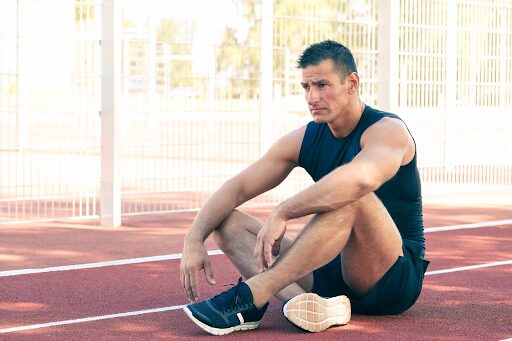There is much performance pressure faced by athletes in their careers, competition, and regular training, which is tough to handle. Controlling it is important for success and mental health. Thus, many solutions can be come up with, from forming strong willpower to practicing relaxation. At the same time, some practice mindfulness to gain concentration and remove self-consciousness. Further, and helping in this respect, the integration of coaches and teammates is also very important. Thus, understanding how athletes handle performance pressure offers valuable insights for aspiring sportspeople and anyone striving to thrive in high-pressure situations.
Strategies Athletes Use To Manage Performance Pressure
1. Mental resilience training
Mental resilience training involves practicing and establishing mental techniques that prepare athletes to withstand performance pressure. This training is important since it prevents them from being overwhelmed by stressful situations and adversity. Performing areas include motivational reading and mindfulness meditation to keep the focus on the present and calm their nerves before the competition day. Involvement in such exercises prepares them for challenges that may occur during the performance.
At the same time, this training can help an athlete who has built mental toughness remain unflustered even in the most intense situations, experience disappointments, and perform their best in most instances, boosting their performance and well-being.

|
2. Stress-relief practices
For athletes, it is often a question of how they maintain such high-stress levels. They are constantly under high amounts of competition. It is no surprise, then, that many sportspeople incorporate practices that are quite commonly used. These include meditation, yoga, or deep breathing techniques. Such practices assist in improving focus while promoting mental well-being as a whole.
Besides, several other ways of relieving stress, including all sorts of hobbies, from sports to the arts, take your mind off the competition and enable you to de-stress. Running or swimming also works for some people since these exercises lower anxiety and release stress buildup.
3. Visualization techniques
Athletes use several powerful mental strategies. One of them is visualization, which is basically imagery of performance. Visualization facilitates an athlete's performance under pressure in any active sport. Doing so puts their minds at ease, lowering stress levels and thus allowing them greater concentration.
Many sportsmen and women do it as a habit, usually just before competitions or training sessions. These may include picturing jumping up and down or nailing a last-minute goal during a match. The result is increased self-efficacy and an increased capacity for dealing with very stressful situations due to the repetitive nature of visualization practice.
4. Strong support systems
Strong support systems may help athletes release pressure. This system includes coaches, teammates, family members, and sports psychologists, who are instrumental in offering emotional and mental support. Coaches provide athletes with skill refinement and tactical knowledge by encouraging and assisting them in developing their designs. Meanwhile, teammates help raise the spirit.
Also, sports psychologists can give athletes methods to control stress, self-efficacy, and concentration. These features, combined, form a robust support structure that addresses the adverse effects of competition and stresses that affect athletes' performance.
5. Effective time management
Time is an athlete's most valuable resource; handling training, competitive events, and daily life under performance pressure becomes the most challenging process. Athletes ensure that time is managed effectively during focused training, recovery, and mental preparation by organizing tasks according to importance and clearly defining achievable goals. Furthermore, having a well-planned schedule enables the athlete to focus on relatively more manageable components.
Moreover, taking advantage of resources such as calendars and notifications helps improve a given level of organization to the extent that an individual meets the average level of deadlines and re-establishes work-life balance. Lastly, good time management means that athletes can achieve the maximum for themselves while not feeling strained.

|
6. Goal-setting strategies
A clear goal is most important for athletes, as it helps them perform under pressure. By having a clear and achievable goal, the athlete does not have to be broad-minded even in a competition, as they focus on specific targets. This includes setting smaller goals, which are easier to manage, thus allowing the athlete to achieve step by step and manage their expectations. People are also encouraged to set short- and long-term goals as these will give them a time frame for achieving the target and the needed boost to remain determined.
At the same time, it is common for athletes to set goals that fit the SMART criteria: specific, measurable, achievable, relevant, and time-bound. This practical approach improves performance and encourages confidence, allowing the athlete to perform well under pressure and improve constantly.
7. Use of boosters and supplements
Performance boosters and other supplements are quite popular among athletes who seek to perform better and cope with the competitive aspects of their sport. Because of these reasons, Kratom, which is a natural supplement, has also gained some popularity. For certain athletes, there might be some strains that they might feel aid in providing an extra boost of energy and focus during rigorous training or competitions. Every person's experience will differ, so it’s important to know the strands for different purposes.
As a result, those considering the use of kratom may start looking for more information about the kratom strains themselves, which may help them better understand their performance targets. All athletes must be able to evaluate the supplement they will be taking and its risks and benefits through research and discussion with professionals.
Closing Lines
In conclusion, the ability of athletes to manage their performance pressure is critical in ensuring their successful lives as athletes and their personal lives. Through the adoption of mental resilience-building exercises, effective time management strategies, and appropriate visualization, they may be able to cope with the rigorous expectations of their sport. It is not only athletes who will find understanding these strategies helpful but also anyone likely to find themselves in a strategically challenging position. The main point, however, is that when performance is viewed in its fullness, performance enhancement in sports and other aspects of life becomes easily achievable.







